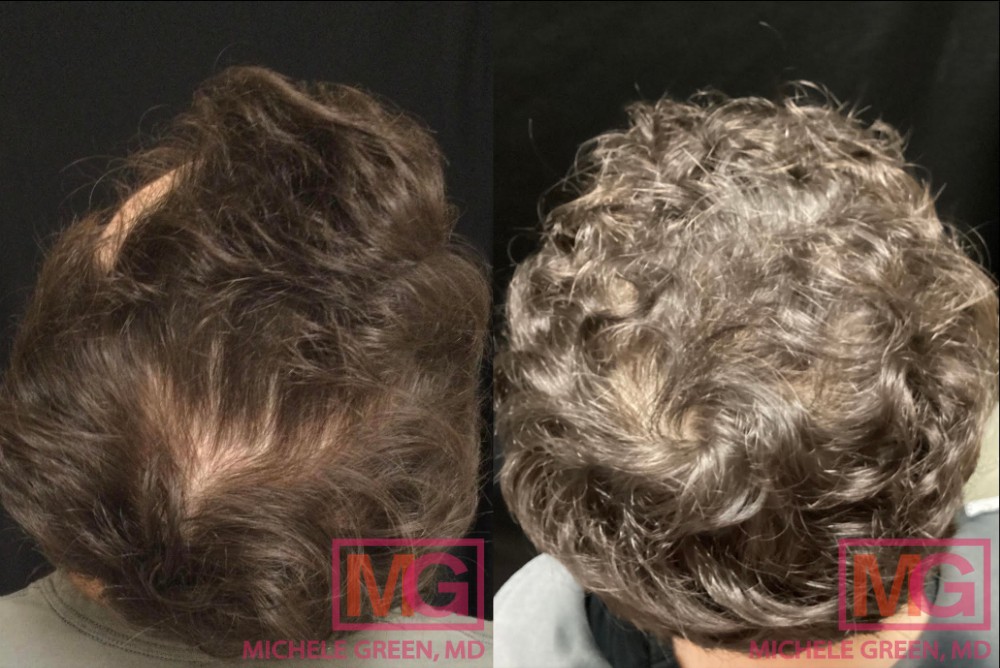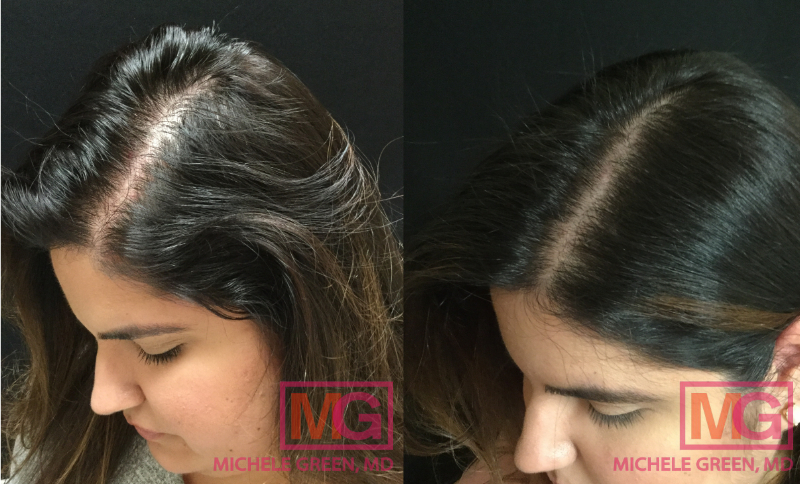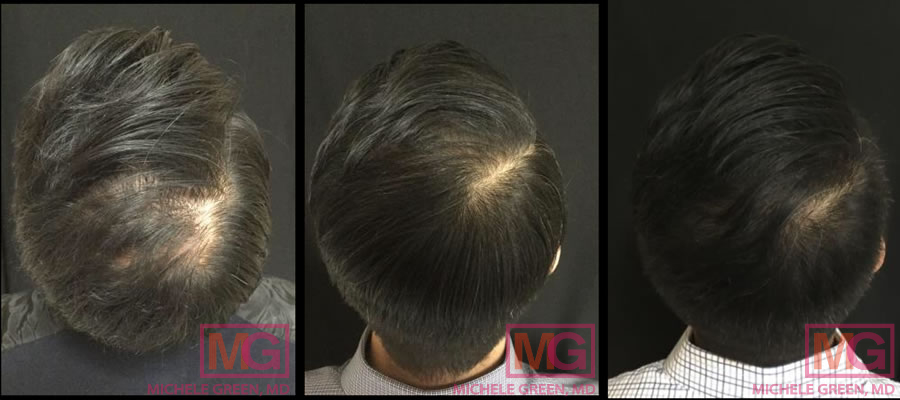Does Ozempic Cause Hair Loss?
Ozempic is a prescription drug with the active ingredient Semaglutide, used to help moderate the effects of type 2 diabetes, as the drug helps the body produce insulin. One additional effect of the drug was that it helped keep patients feeling full for longer, which meant that Ozempic quickly gained popularity as an off-label means to achieve rapid weight loss. In 2021, Semaglutide and Tirzepatide were FDA-approved to help with weight loss with the injectable treatment known under the brand names WeGovy and Mounjaro. In clinical trials, WeGovy, Mounjaro and Ozempic were shown to be effective but had many potential side effects, one side effect, which was demonstrated to affect between 3 and 6% of patients in trials, was reported hair loss. Suppose you are experiencing any form of hair loss. In that case, the best first step is to contact a board-certified, expert dermatologist, such as Dr. Michele Green, to assess the situation, determine the direct cause of the hair loss, and develop a treatment plan that will work for you.
Many types of hair loss can occur. When combatting type 2 diabetes or working to lose weight quickly, the two most common forms of hair loss are alopecia areata and telogen effluvium, respectively. While type 2 diabetes is not considered an autoimmune disease, scientists believe that patients with type 2 diabetes are at an increased risk of developing alopecia areata, which occurs when the body begins to attack its hair follicles. When taking Ozempic as a weight loss drug to combat obesity and promote weight management, the rapid weight loss can cause a stress response in the body, resulting in telogen effluvium, which is hair loss that occurs as a result of stress or trauma to the body. No matter the underlying cause, Dr. Green has solutions available to combat hair loss and promote increased hair growth.
Board-certified dermatologist Dr. Michele Green has been expertly treating patients in her Upper East Side New York City office for over 25 years. Dr. Green is highly adept at meeting each patient where they are, providing individualized treatment plans to best address their unique needs and aesthetic goals. When it comes to treating hair loss, Dr. Green offers many treatment options, including PRP infusions to strengthen the hair follicle and promote hair growth, and prescription medications, such as minoxidil and finasteride. Well known for high-patient satisfaction, Dr. Green has consistently been voted one of New York City’s best healthcare providers by such publications as Castle Connolly, New York Magazine, the New York Times, and Super Doctors.

What is Ozempic?
Ozempic has been traditionally used as a diabetes drug to help the body produce insulin and regulate blood sugar levels. Still, when it was noted that the drug helped to manage body weight, it was also studied and approved as a weight-loss treatment. The medication comprises the active ingredient Semaglutide, a glucagon-like peptide receptor (GPL-1) drug that helps promote insulin production. Ozempic is a highly effective treatment option for patients with type 2 diabetes and has been shown to decrease the risk of developing major cardiovascular events, such as heart attack, in patients taking the Semaglutide medication; however, it is typically prescribed only after other potential solutions to mitigate the effects of diabetes have been attempted, such as regulated diet and exercise.
How does Ozempic work for Type 2 Diabetes?
When used to treat type 2 diabetes, Ozempic is highly effective at promoting insulin production in the pancreas, which helps the body convert glucose from food into energy. Patients with type 2 diabetes produce insufficient insulin to effectively manage blood sugar levels, which can be very dangerous. The Semaglutide found in Ozempic acts as the natural hormone glucagon-like peptide 1 (GLP-1), which is produced to detect nutrients in the food we have consumed. There are three ways in which Ozempic works to manage the absorption of nutrients in the body: First, it can detect when blood sugar levels are high and trigger the increased production of insulin in the pancreas. Second, it manages the levels of glucose production in the liver so that blood sugar levels do not get too high, and third, it slows the digestion process, which keeps food in the stomach for longer.
What is Wegovy for weight loss?
One of the noticeable common side effects of Ozempic was weight loss; soon, patients started using Ozempic off-label as a weight loss drug. Ozempic for weight loss was later FDA-approved in 2021 and sold under the brand name WeGovy as an injectable treatment option for weight maintenance. WeGovy works by inhibiting appetite, as food is digested more slowly and kept in the stomach for longer. As a result, patients are less inclined to eat, restricting their calorie intake for rapid and noticeable weight-loss effects.
What are the side effects of Ozempic?
Ozempic is associated with many potential side effects, and patients should exercise caution before taking this medication for type 2 diabetes or weight loss. Potential side effects include:
- Gastrointestinal trouble, such as nausea, vomiting, constipation, diarrhea, and abdominal pain
- Hyperglycemia (low blood sugar), which can lead to blurred vision, sweating, anxiety, dizziness, shakiness, headaches, slurring speech, hunger, or weakness
- Elevated heart rate
- Kidney failure
- Medullary thyroid cancer (also known as medullary thyroid carcinoma)
- Severe allergic reaction
If you experience any severe side effects, inform your healthcare provider immediately.
Is hair loss a side effect of Ozempic?
Hair loss is not listed as a potential side effect of Ozempic, though some patients may experience hair loss while taking the Ozempic medication for type 2 diabetes. However, researchers believe that the hair loss or baldness that occurs while taking Ozempic has less to do with the drug than with the underlying condition. Type 2 diabetes can be a risk factor for developing alopecia, which is a condition in which hair thinning and hair loss occur. One type of alopecia that may occur due to type 2 diabetes is alopecia areata, which is related to autoimmune diseases where the body attacks itself, causing hair follicles to be damaged, shrink, and cease production of new hair. While Ozempic works to control the symptoms of type 2 diabetes through insulin production, the underlying condition can still create problems in the body, such as hair loss.

Does Ozempic cause hair loss when used as a weight loss drug?
While Ozempic does not list hair loss as a side effect of the drug, according to NBC, a clinical trial testing the effectiveness of Ozempic and WeGovy for weight loss found that 3% of patients experienced hair loss as a side effect of the treatment compared to 1% who received a placebo. However, the hair loss most likely occurred due to the stress of the rapid weight loss and reduced calorie intake rather than the medication itself. When the body undergoes significant stress or trauma, a type of hair loss known as telogen effluvium can occur. Telogen effluvium is a condition characterized by temporary hair loss after a significant traumatic event, such as weight loss, surgery, pregnancy, injury, or severe fever. When under this kind of stress, the body ceases non-essential functioning in the body, which includes the growth of new hair. As a result, the hair rapidly enters the resting phase, and significant shedding occurs approximately six months after the traumatic event. Typically, telogen effluvium is a temporary condition, and the hair resumes normal growth cycles once the stress has been resolved.
Does Ozempic make your hair fall out?
On social media sites, such as TikTok and Instagram, you may have seen influencers posting about hair loss as a side effect of Ozempic. For the most part, these people have been taking Ozempic or WeGovy for weight loss showing pictures of the insides of their showers where their hair has fallen out into the drain. While hair loss can occur while patients are taking Ozempic, this hair loss is attributed to correlation rather than causation, meaning that the medication itself is not what is causing the hair loss or hair thinning to occur. Often, when sudden and significant weight loss occurs, the body goes through intense stress, leading to a type of hair loss known as telogen effluvium.
Does Ozempic cause hair thinning?
Patients from New York to Los Angeles are looking for ways to lose weight quickly – trying to look like a model in a Getty image. Some may turn to Ozempic or WeGovy for weight-loss treatment, and while the drugs themselves do not cause hair thinning or hair loss, decreased calorie intake and the stress of losing weight quickly can lead to hair thinning. Hair growth and texture are negatively impacted when patients do not receive enough nutrients from food. As such, patients must maintain a healthy diet during and after WeGovy or Ozempic for weight loss.
Can Ozempic cause hair thinning in patients with Type 2 Diabetes?
Type 2 diabetes can impact hair growth, leading to thinning hair even while taking Ozempic. Ozempic helps to mediate the symptoms of type 2 diabetes by increasing insulin production in the pancreas when blood sugar levels are low and preventing the release of too much sugar from the liver. While Ozempic helps with these symptoms, the underlying condition may still lead to hair thinning. Dr. Green has many solutions available at her Upper East Side dermatology office. The first step to achieving fuller, healthier hair is to make an appointment with Dr. Green.
How to stop hair loss from Ozempic
When it comes to treating hair loss, many treatment options are available at Dr. Michele Green’s New York City dermatology office. There are many over-the-counter treatment options available, such as supplements like biotin. Still, the most powerful and effective treatments are the ones prescribed or performed by an expert, board-certified dermatologist, such as Dr. Green. Dr. Green will often begin by turning to the following treatment options:

PRP for Hair Loss – Platelet-rich plasma (PRP) injections are a highly effective treatment option for strengthening the hair follicles and activating growth factors to increase hair growth. The solution is derived from the patient’s blood and centrifuged to isolate the platelet-rich plasma, which nourishes and regenerates the hair follicles when injected into the scalp. The effects of the treatment include a longer growth phase and thicker hair follicles for denser, healthier hair. PRP can be effectively used for patients struggling with telogen effluvium to help boost hair regeneration.
Minoxidil for Hair Loss – Minoxidil is an oral medication that was originally used to treat hypertension and high blood pressure but has been demonstrated to treat hair disorders such as alopecia when taken in low doses. The medication works by increasing blood flow to the hair follicles, which makes the growth phase of the hair longer and helps to improve hair density. Minoxidil can also be applied topically, although topical minoxidil may negatively impact hair texture. When determining the dosage for oral minoxidil, it is always best to seek treatment from an expert dermatologist, such as Dr. Green.
Finasteride – Finasteride is another topical medication that works to boost the growth of the hair follicles for new hair growth. The medication works by inhibiting the production of the hormone partially responsible for hair loss, dihydrotestosterone (DHT). By reducing the functioning of DHT, hair loss is slowed by as much as 70%.
Does Ozempic make your hair grow?
Ozempic is a medication designed specifically to help mediate the effects of type 2 diabetes by moderating insulin levels and to help with weight loss. While patients may experience hair loss while taking Ozempic, it is often due to the effects of diabetes or the stress that sudden weight loss has on the body. Ozempic does not cause hair to grow and should not be used as a hair growth medication.
Will my hair grow back after stopping Ozempic?
Patients who have taken Ozempic as a weight-loss drug may experience hair loss approximately three to six months after beginning treatment due to the stress the body undergoes when calorie intake is decreased. This type of hair loss is known as telogen effluvium, or hair loss that occurs due to trauma or stress to the body. While losing hair due to this condition is often very distressing, telogen effluvium is typically only temporary, and the hair grows back once the stress has been resolved. To help the hair grow back quickly and with high density, Dr. Green recommends that patients try PRP injections for hair loss.

How to get started with hair loss treatment today
If you are experiencing hair loss or hair thinning due to type 2 diabetes, sudden weight loss, or any form of medication, Dr. Green can help. Many factors can cause hair loss, and effective treatment must be determined depending on the underlying cause. Dr. Green helps patients to determine the underlying cause of their hair loss or hair thinning and generates individualized treatment plans to help boost hair follicle growth and density for full, healthy hair. Dr. Michele Green is an internationally renowned board-certified dermatologist with over two and a half decades of experience providing some of the world’s most discerning individuals with the best non-invasive treatment options available, including for thinning hair and hair loss.
Castle Connolly, Super Doctors, The New York Times, and New York Magazine consistently name Dr. Green as one of New York City’s best dermatologists for her dedication to her patients and expertise. When you consult with Dr. Green at her private dermatology office in Manhattan’s Upper East Side neighborhood for hair loss, she will work with you to create a customized treatment plan that incorporates a combination of in-office procedures, specially formulated products, supplements, and any necessary prescription medications for achieving and maintaining healthier, thicker hair. If you are looking for an expert opinion on any form of hair loss, you can make your appointment with Dr. Michele Green today by contacting us online or calling 212-535-3088 today to learn more.
 212-535-3088
212-535-3088